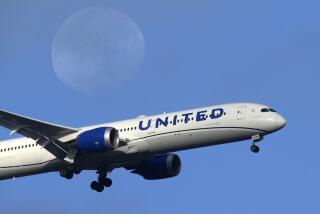Forbidding cellphone calls on airplanes might protect sanity more than safety
- Share via
Early next year, Singapore Airlines will begin to install technology in dozens of planes to let passengers surf the Internet and send e-mail from 35,000 feet in the air, the airline announced last week.
The circuitry that the air carrier will install in at least 40 long-haul jets by 2013 would also allow passengers to make airborne cellphone calls.
But Singapore Airline remains undecided whether to allow cellphone calls.
“As we get closer to the launch date, we will decide whether voice calling in the cabin will be activated,” said James Boyd, a spokesman for Singapore Airlines. One consideration, he said, is whether passengers want to make calls in flight.
Singapore Airlines’ hesitation is not surprising.
Although a handful of airlines in the Middle East and Europe allow cellphone calls during flights, federal regulators in the U.S. prohibit the practice, saying the calls may interfere with an aircraft’s navigation systems.
But the problem may not be the technology. After all, Emirates airline has allowed cellphone calls since 2008. Cathay Pacific announced plans in July to let use their cellphones in the plane by 2012.
A bigger issue may be that passengers and airline crews hate the idea of turning a crowded, airborne cabin into a flying phone booth.
The Federal Communication Commission considered lifting the ban in 2004, but it stopped looking into the idea after being inundated with letters, e-mails and calls in opposition.
The pending reauthorization bill for the Federal Aviation Administration includes a proposal to ban all cellphone calls on U.S. commercial planes — except by airline crews and law enforcement.
In a 2005 survey by the National Consumer League and the Assn. of Flight Attendants, 63% of airline passengers said they opposed cellphone use on planes.
The flight attendants union says the noise and chatter would disturb passengers and make their jobs much harder. “While there is technology available now, it seems that the general public still wants the aircraft to remain cellphone free, so it’s not just flight attendants who have an issue with it,” said Corey Caldwell, a spokeswoman for the group.
• Sky magazine rejects ad that mentions baggage fees
Ads and reviews for jackets and vests made by Idaho-based Scottevest Inc. have appeared in several airline magazines.
After all, the clothing line with multiple pockets is marketed to travelers who want to carry cellphones, music players and other electronic devices.
But last month, the publisher of Delta’s Sky magazine rejected the latest Scottevest advertisement because it contained a message that she found objectionable.
The proposed ad read: “The most stylish way to beat the system. Scottevest travel clothing has specialized pockets to help you stay organized and avoid extra baggage fees.”
Scottevest founder Scott Jordan claims the ad got nixed because Delta Air Lines didn’t want to bring attention to those annoying baggage fees. In the second quarter this year, Delta collected $256 million in baggage fees — the most of any airline in the industry.
Marialice Harwood, publisher of the magazine, defended her decision, saying the ad misleadingly suggested that passengers who stuff their belongings in the pockets don’t have to check bags. She also said the ad came in at the last minute, as the publication was going to print.
Added Jordan: “I think it’s safe to assume that no airline will run this ad.”
• The trip home really feels faster
If you have ever traveled for business and had the feeling that getting to your destination took longer than getting back home, you’re not alone. And it’s not just because of headwinds or tailwinds.
The “going-home effect” was the subject of a recent study published in the Journal of Consumer Psychology by professors at New York University’s Leonard N. Stern School of Business.
The study surveyed 127 undergraduate students who took journeys to unfamiliar destinations and then traveled home again. It found that the students overestimated the time it took to reach the destinations and underestimated the time it took to return.
One possible reason, according to the study, is that landmarks around home are familiar, making us feel that the trip is over and we have arrived — long before we walk in the front door.
hugo.martin@latimes.com
More to Read
Sign up for Essential California
The most important California stories and recommendations in your inbox every morning.
You may occasionally receive promotional content from the Los Angeles Times.













